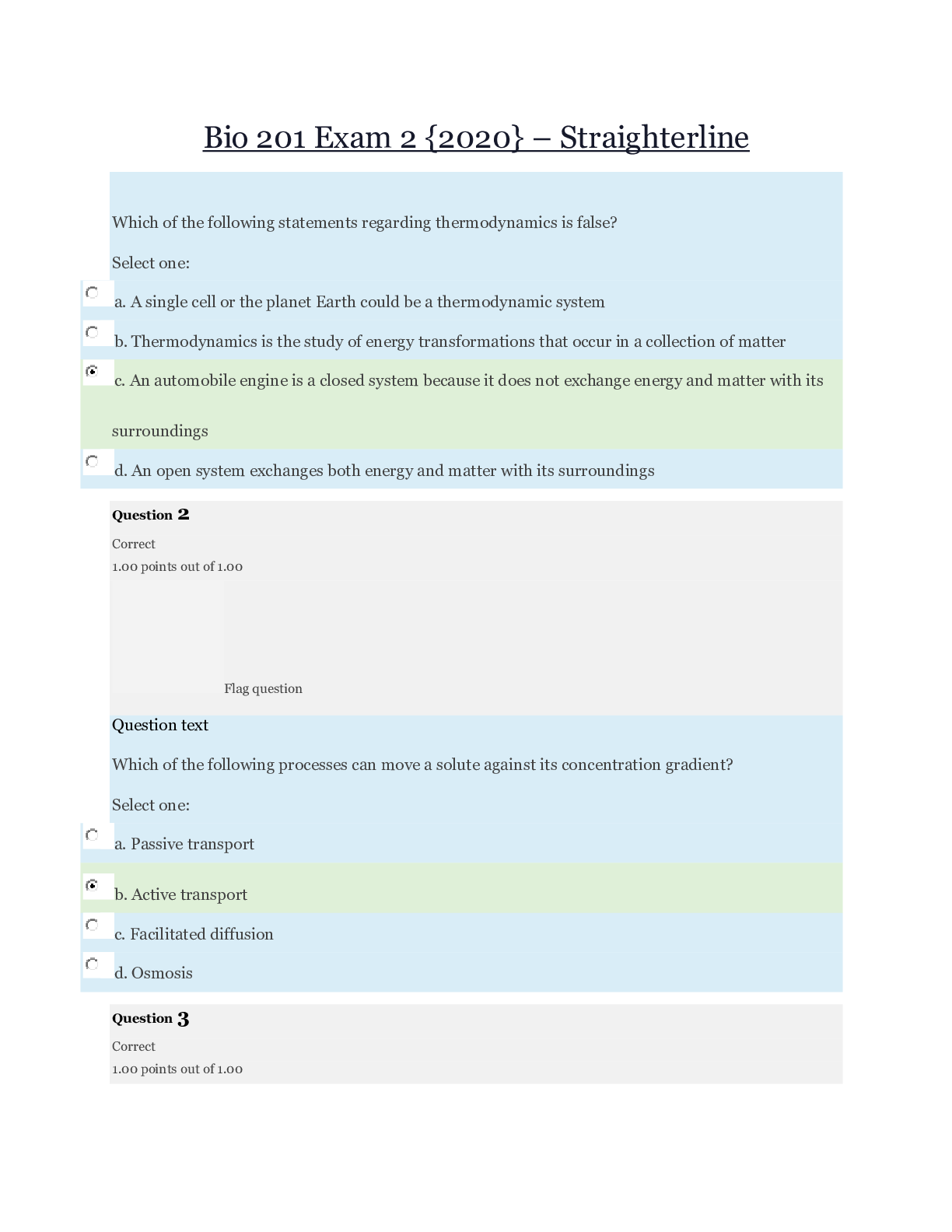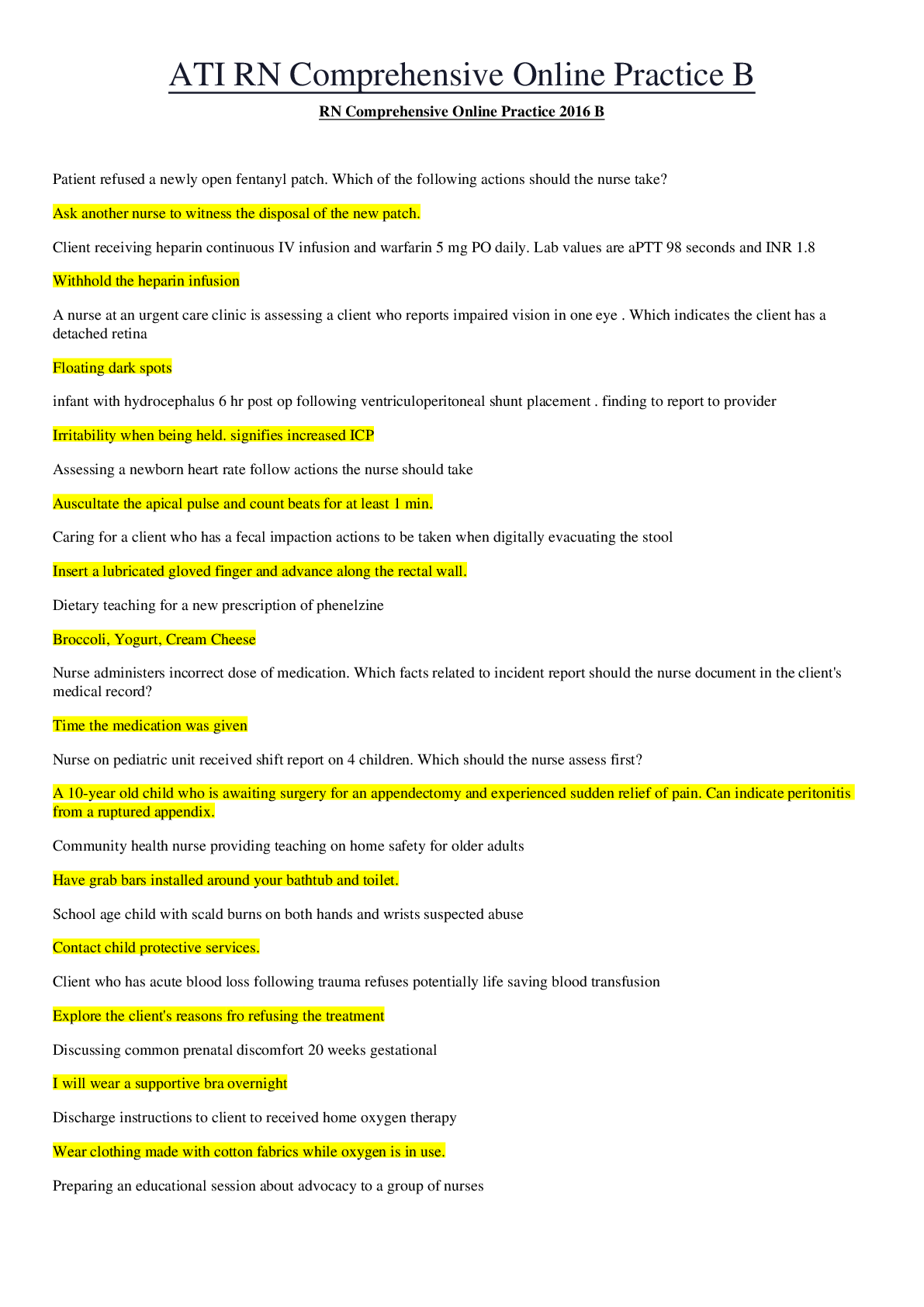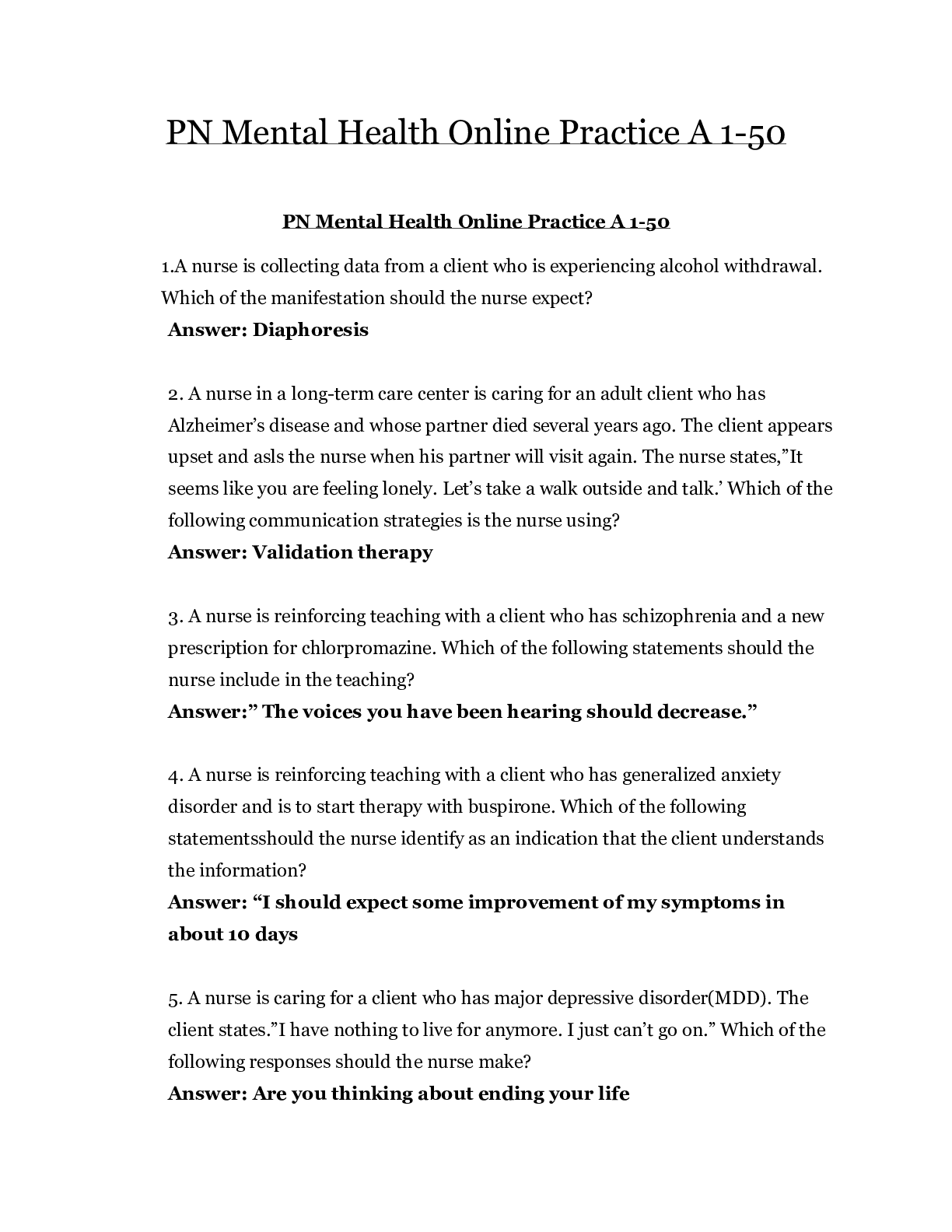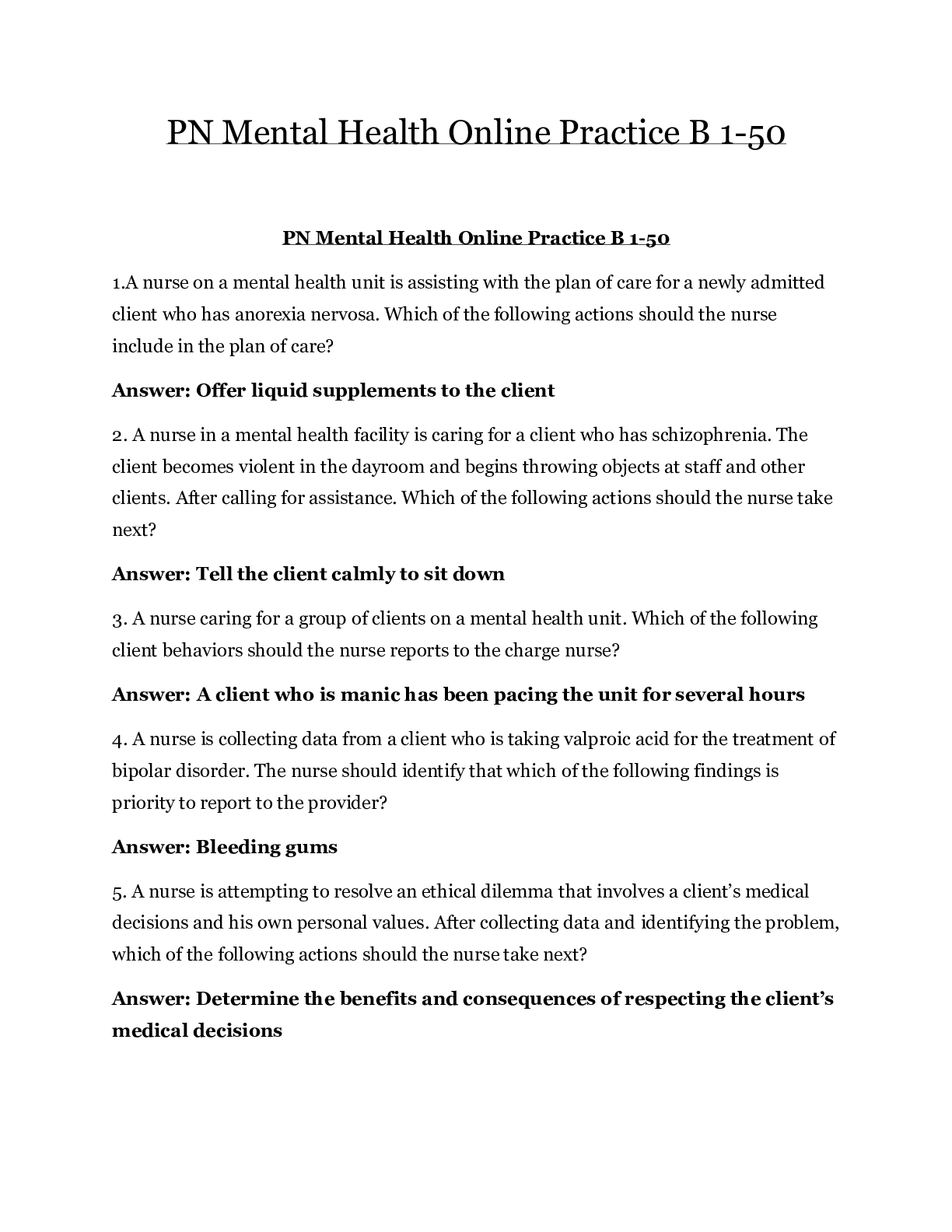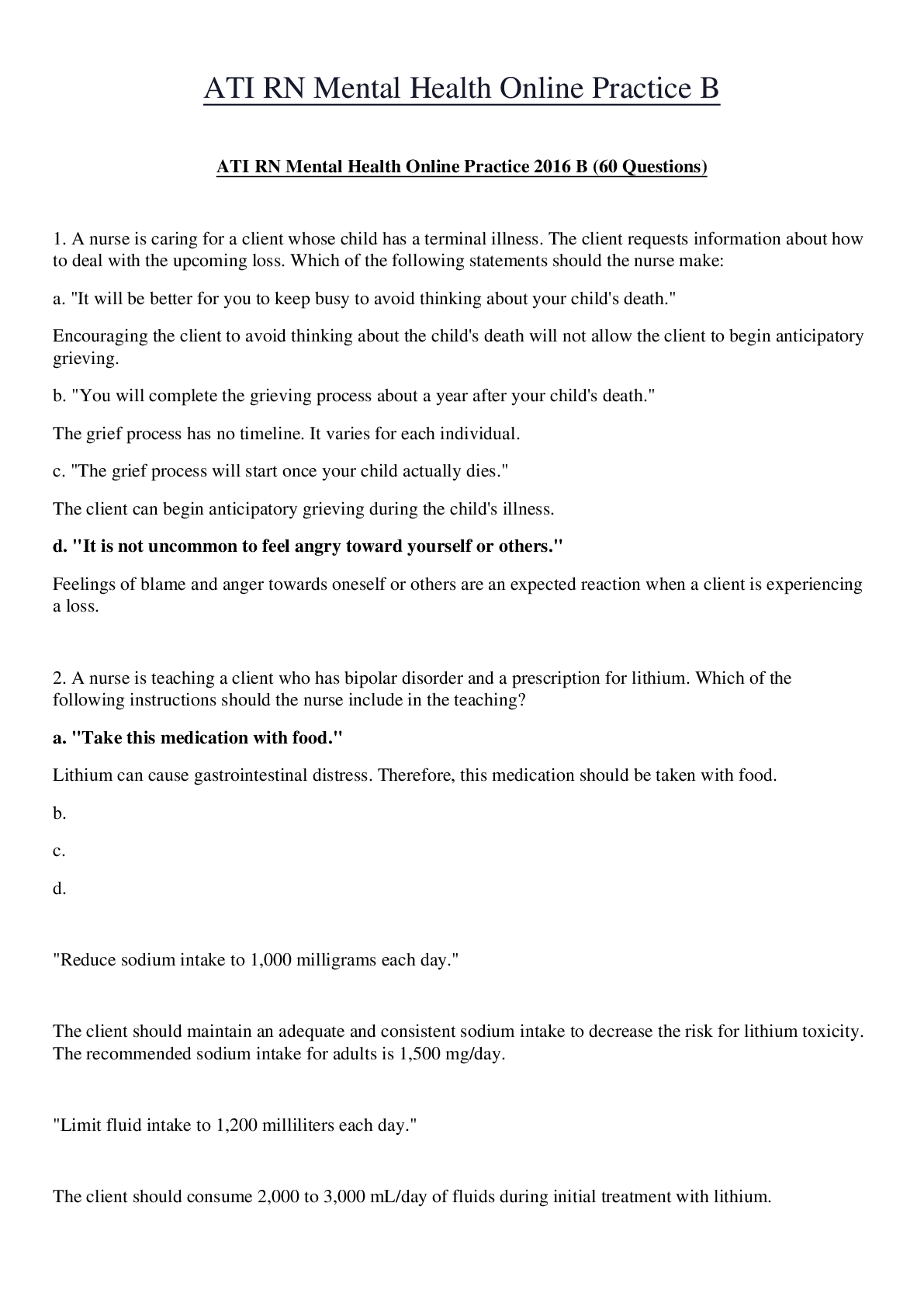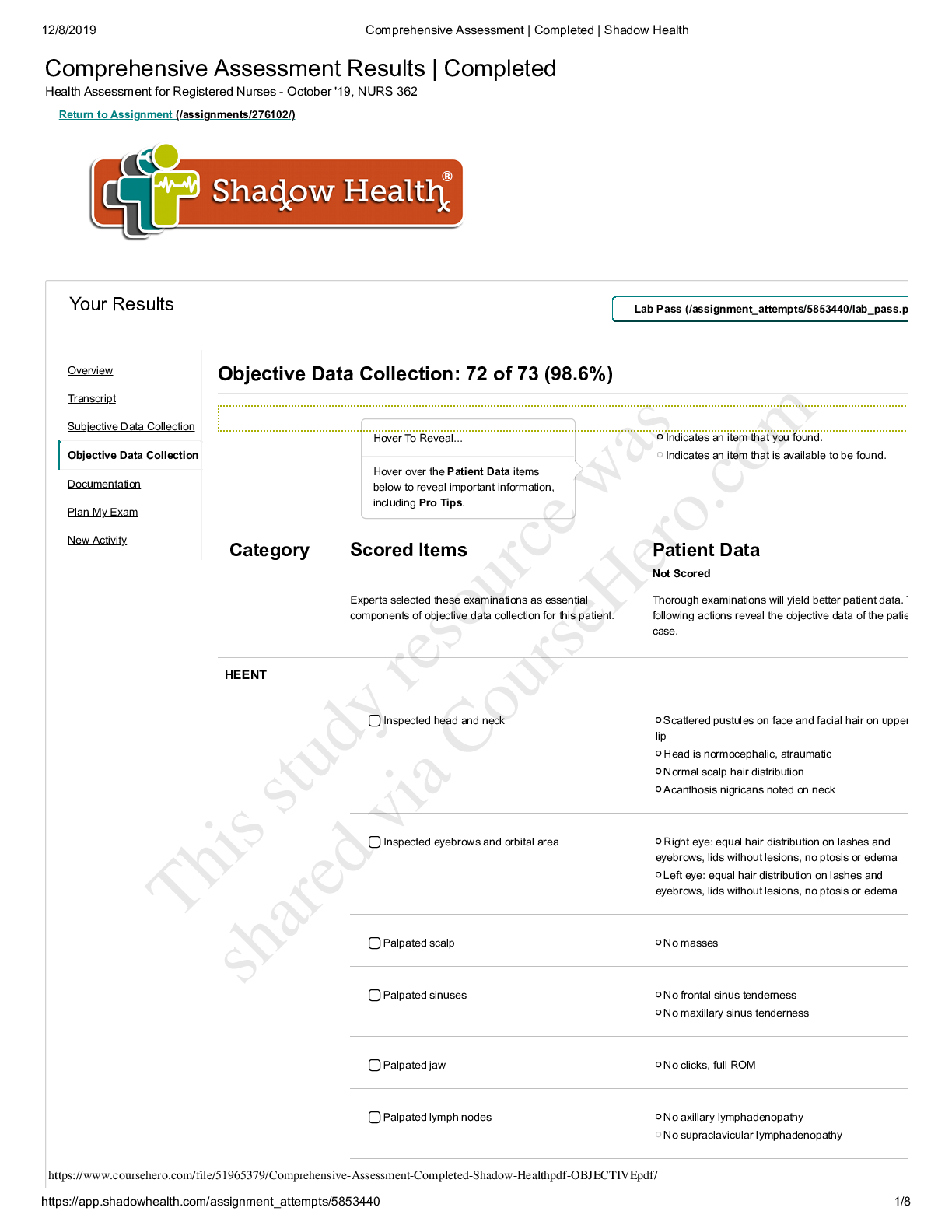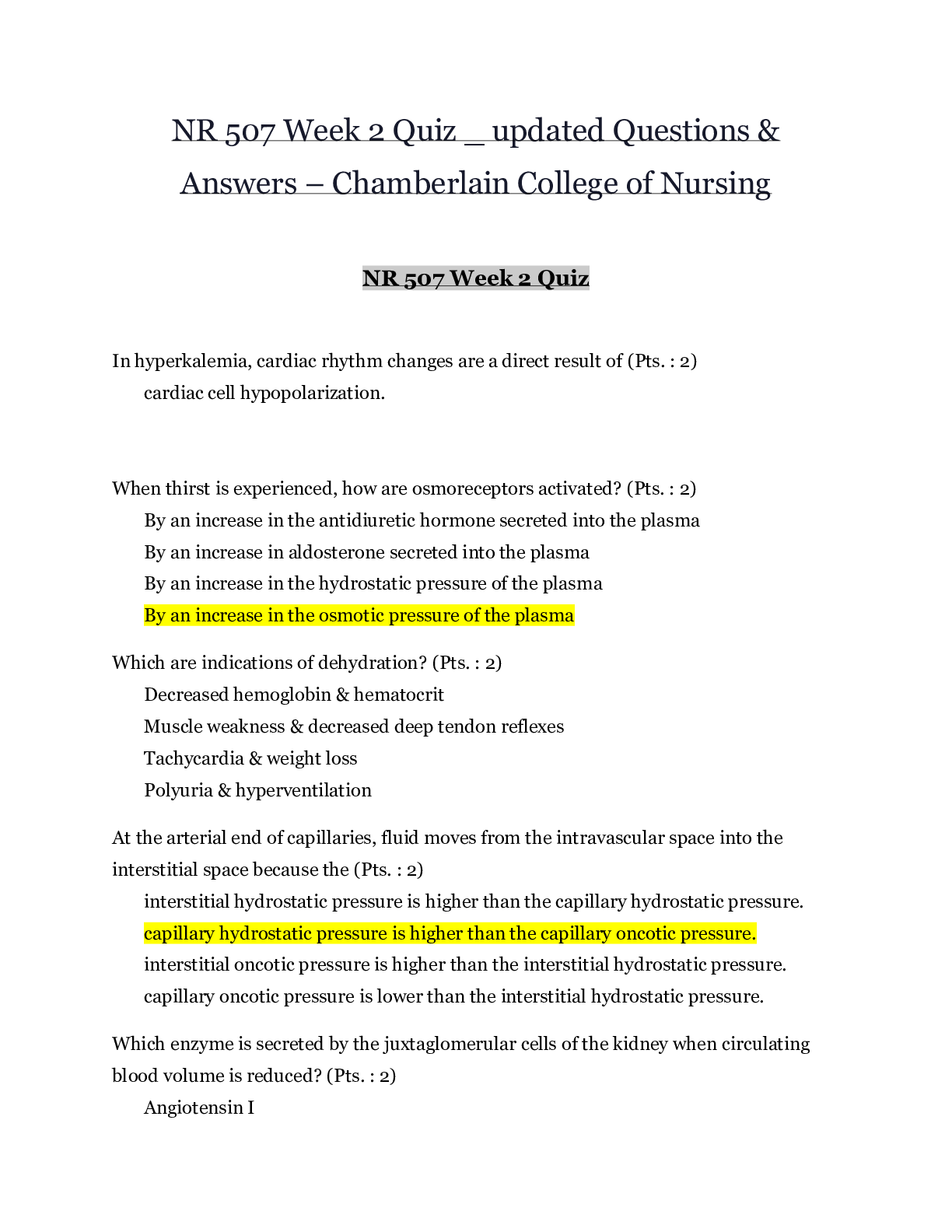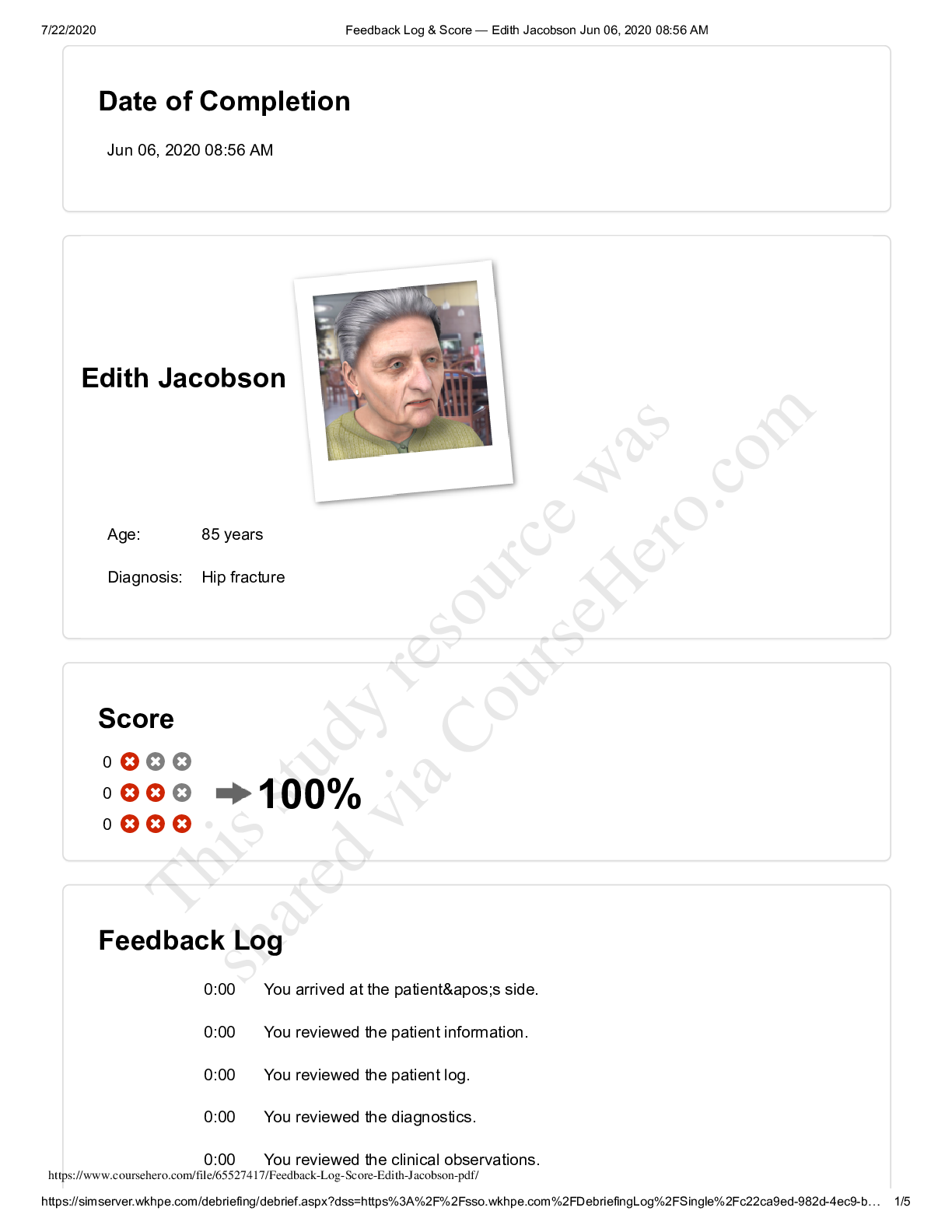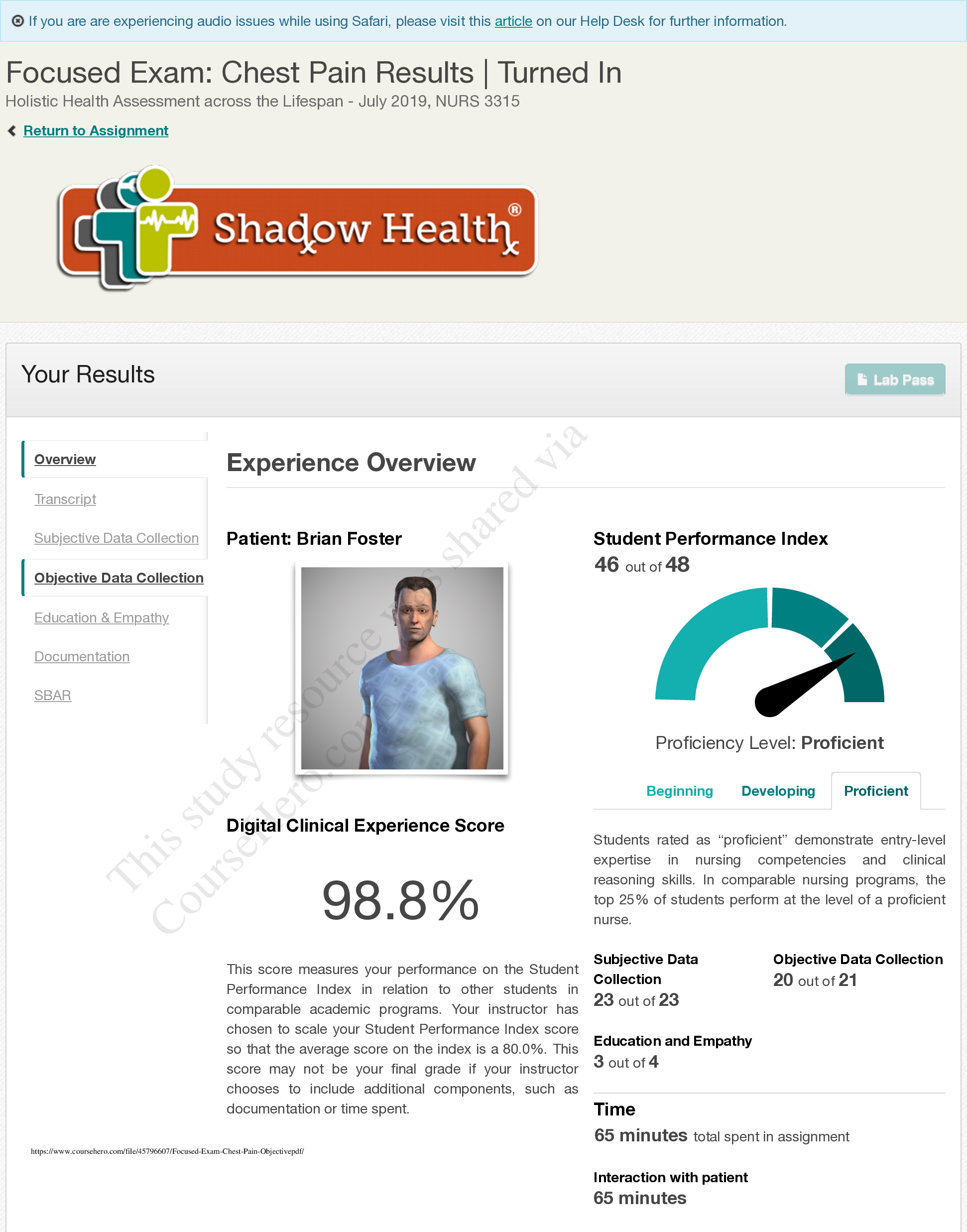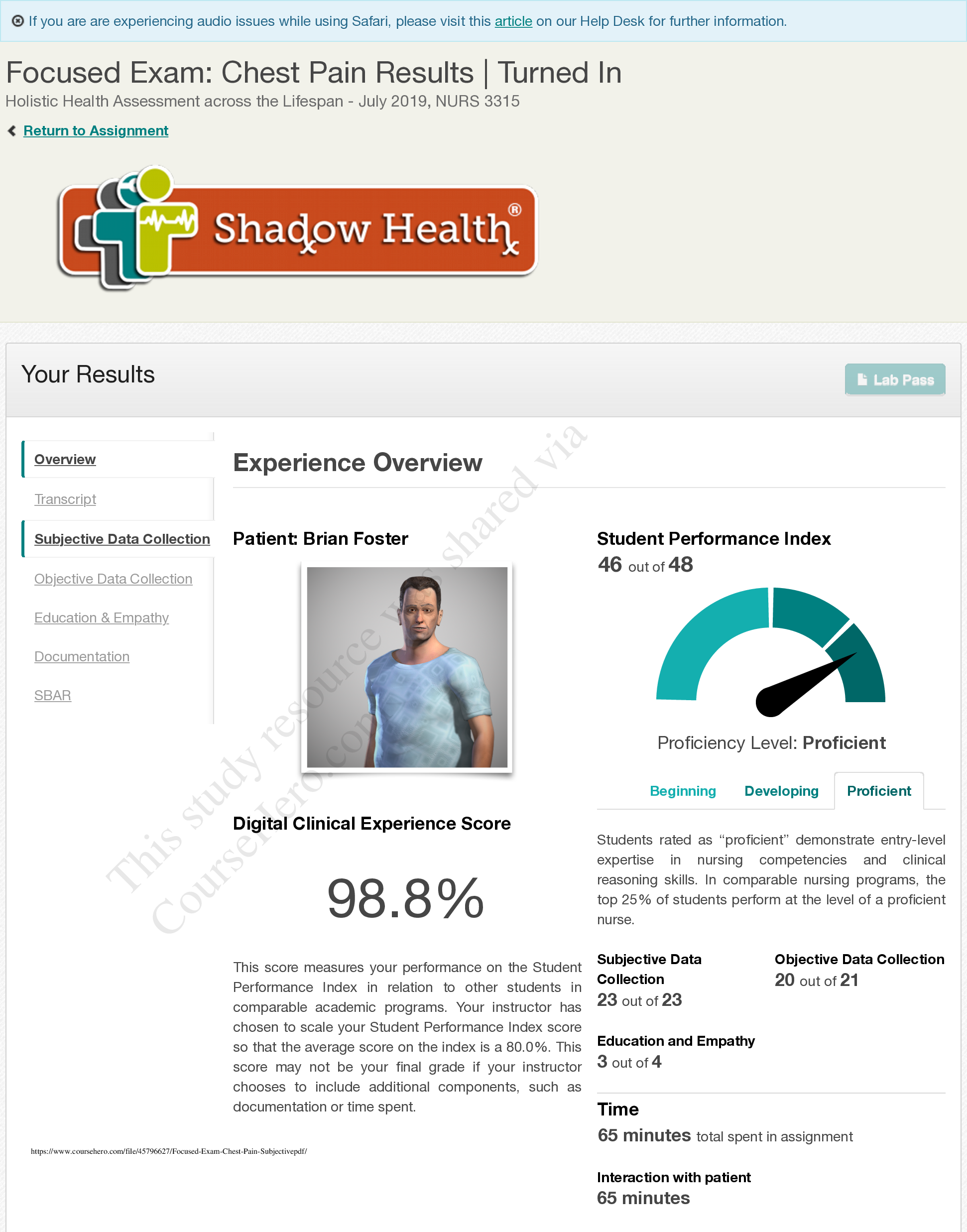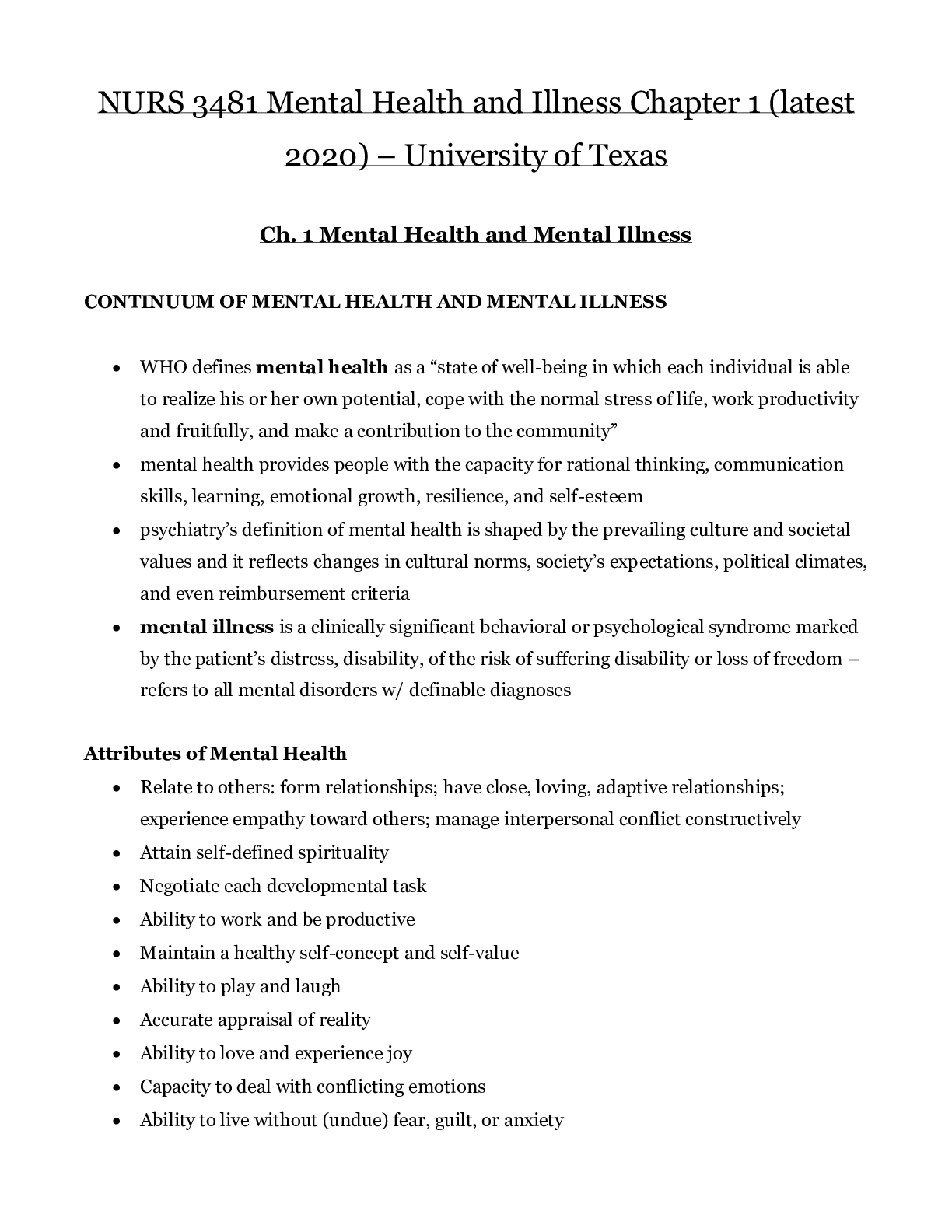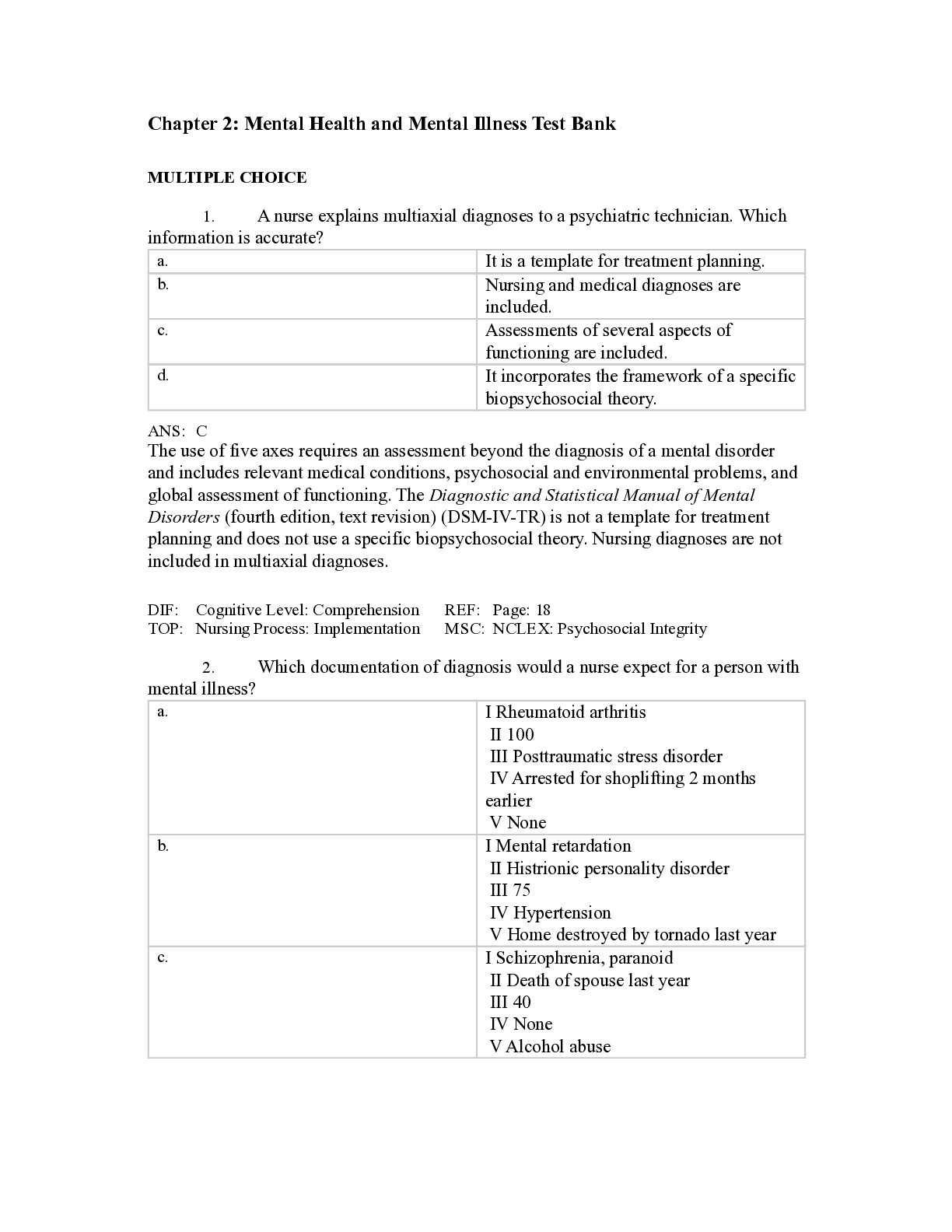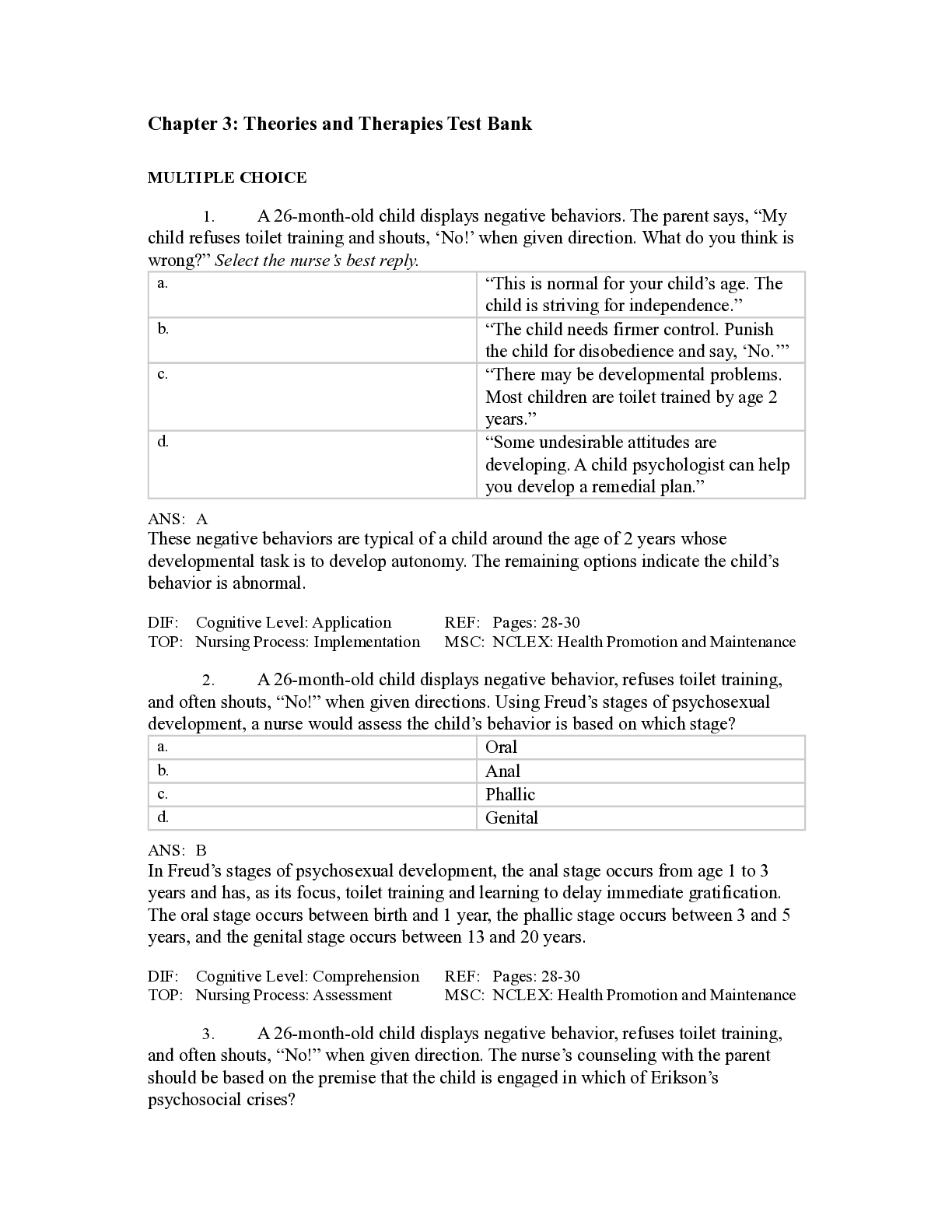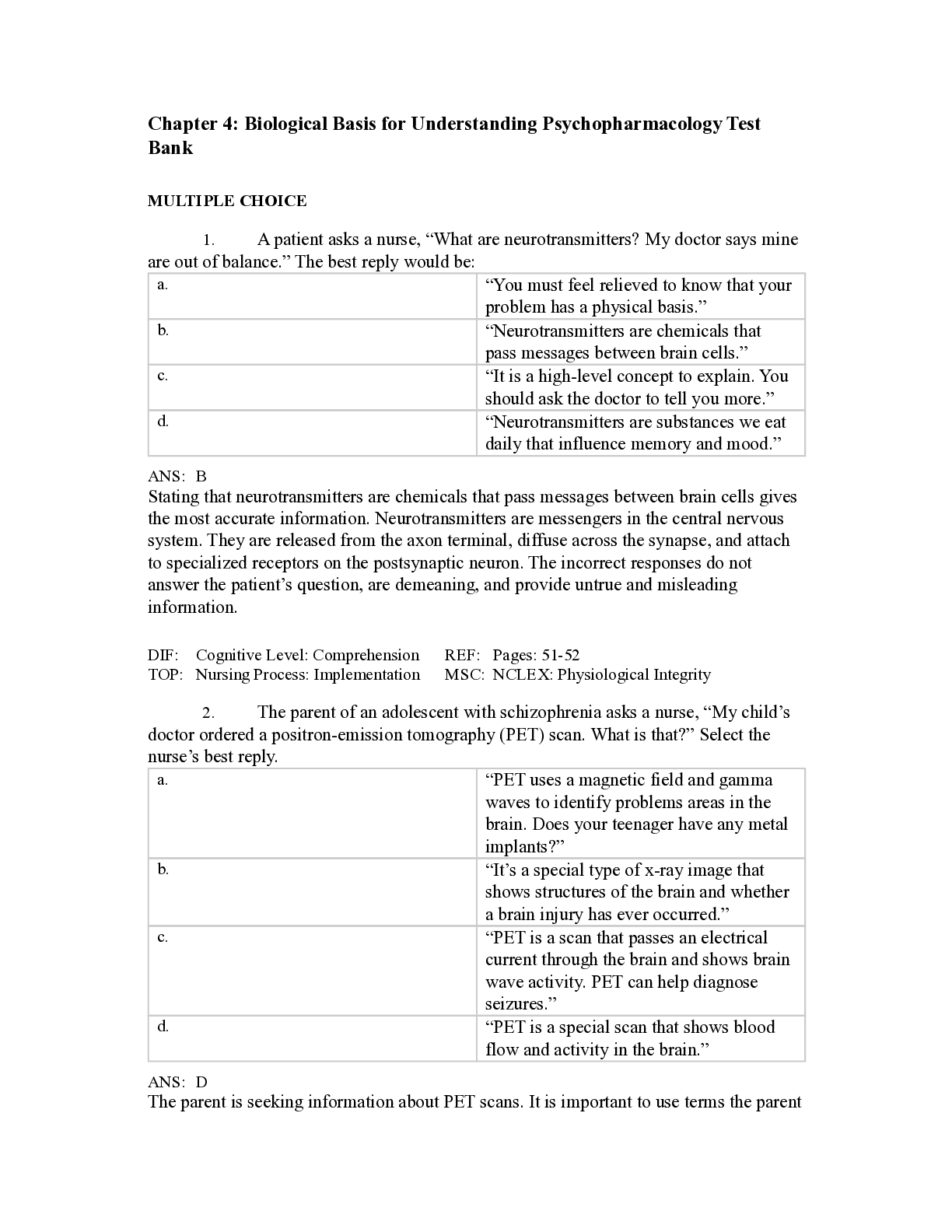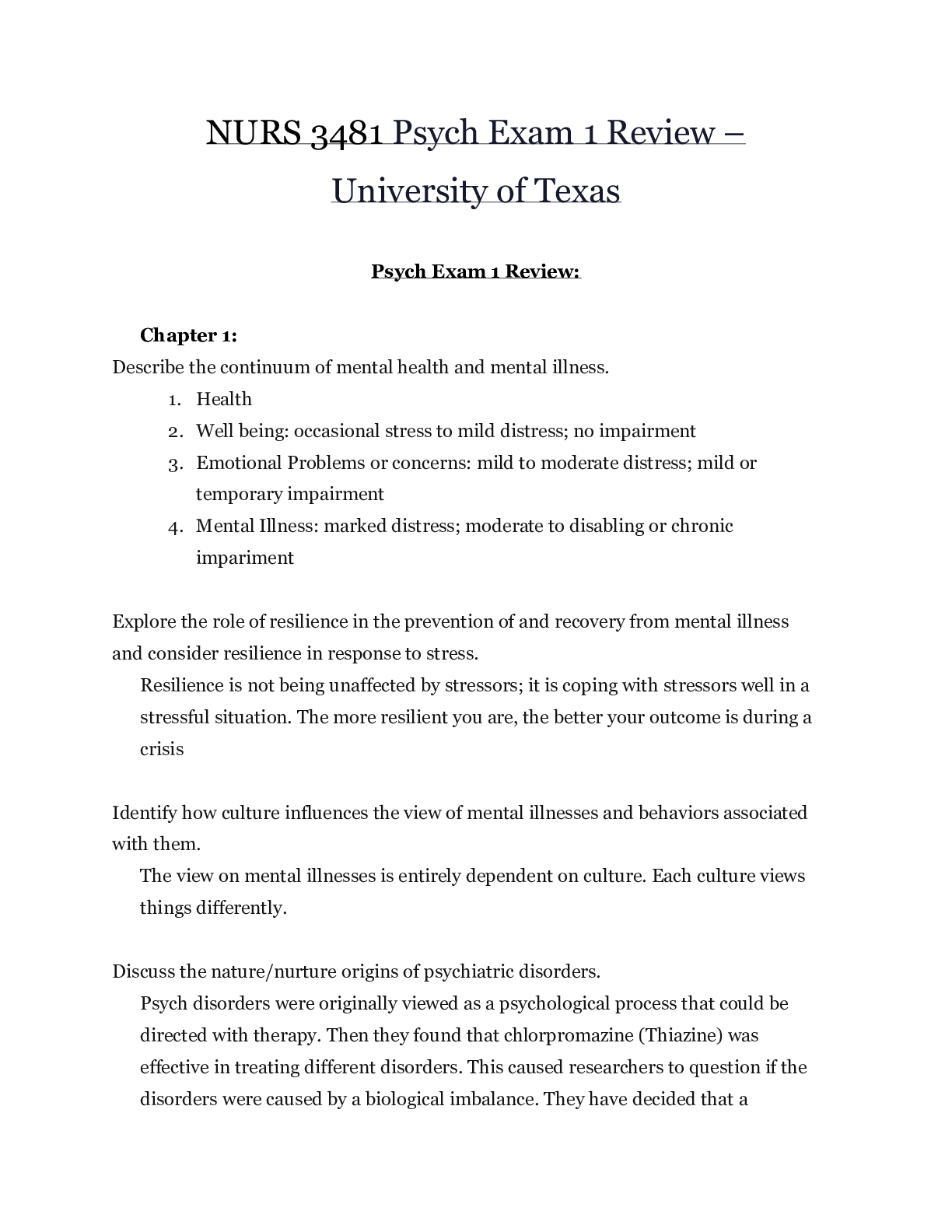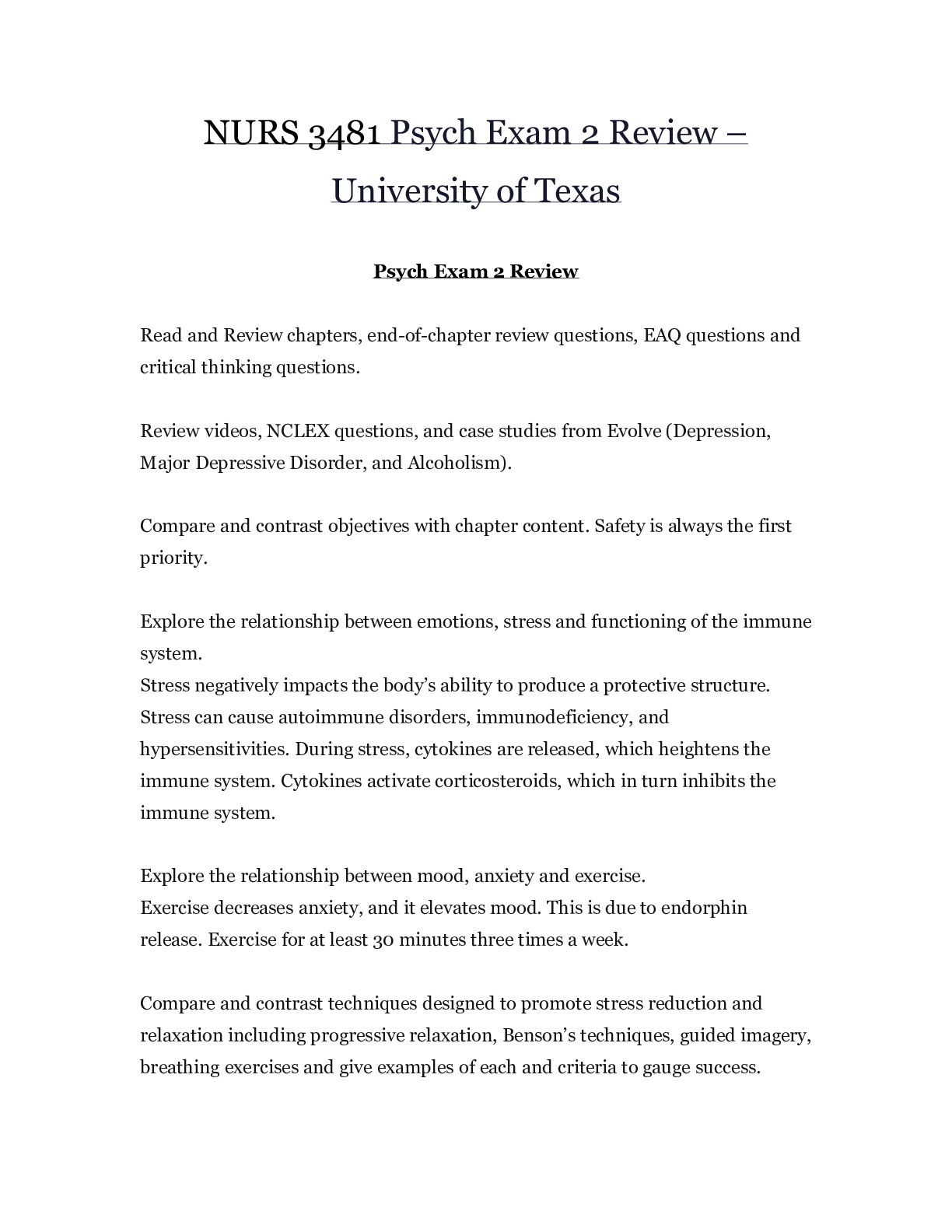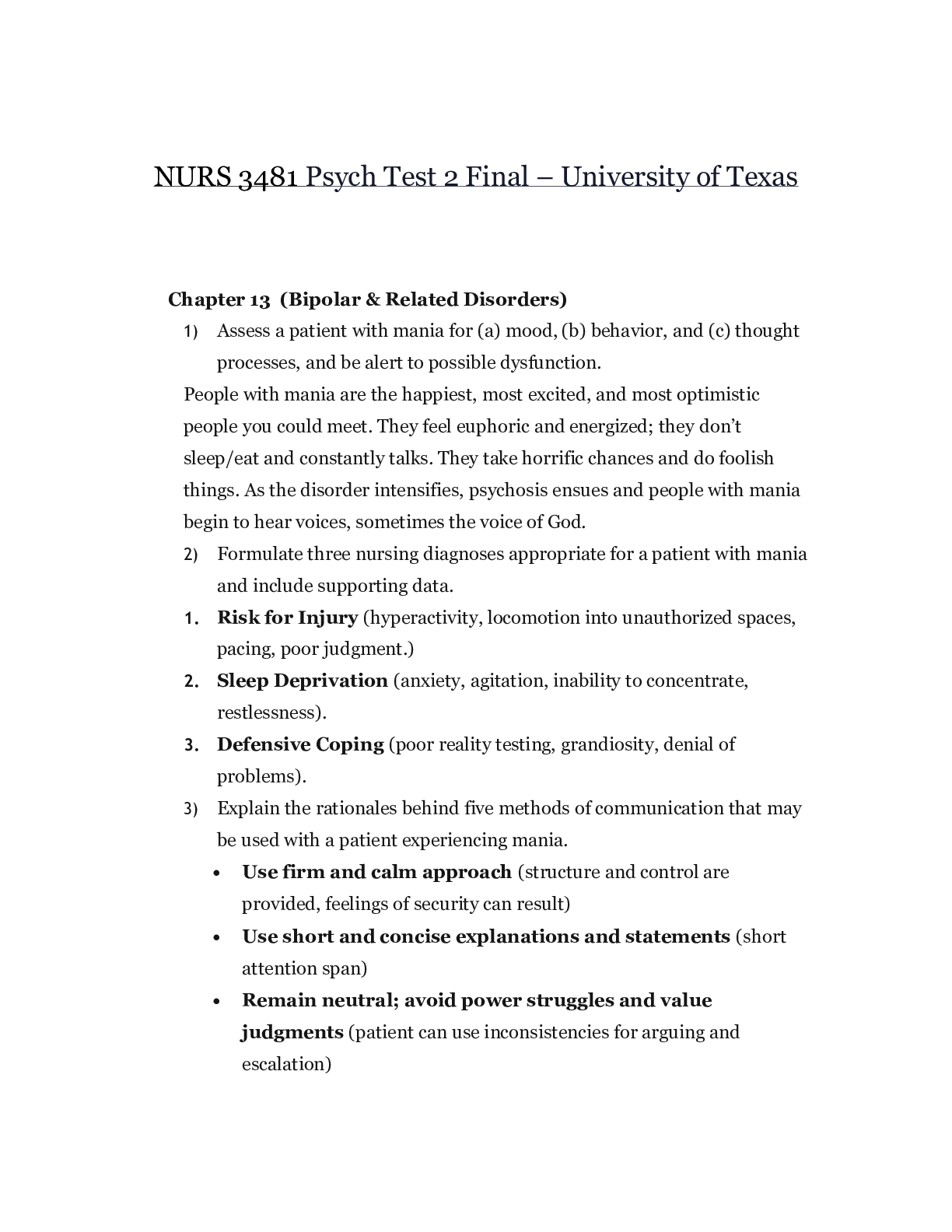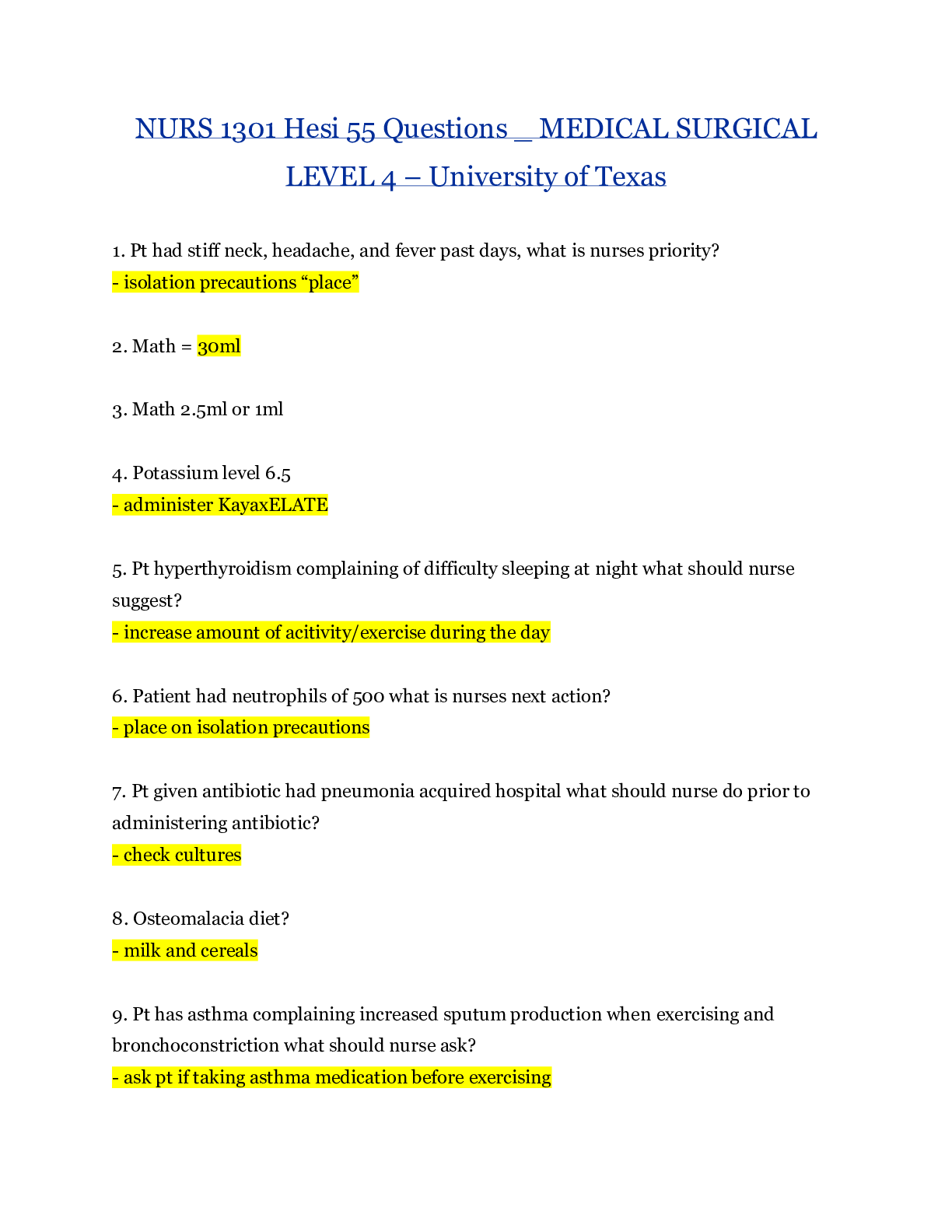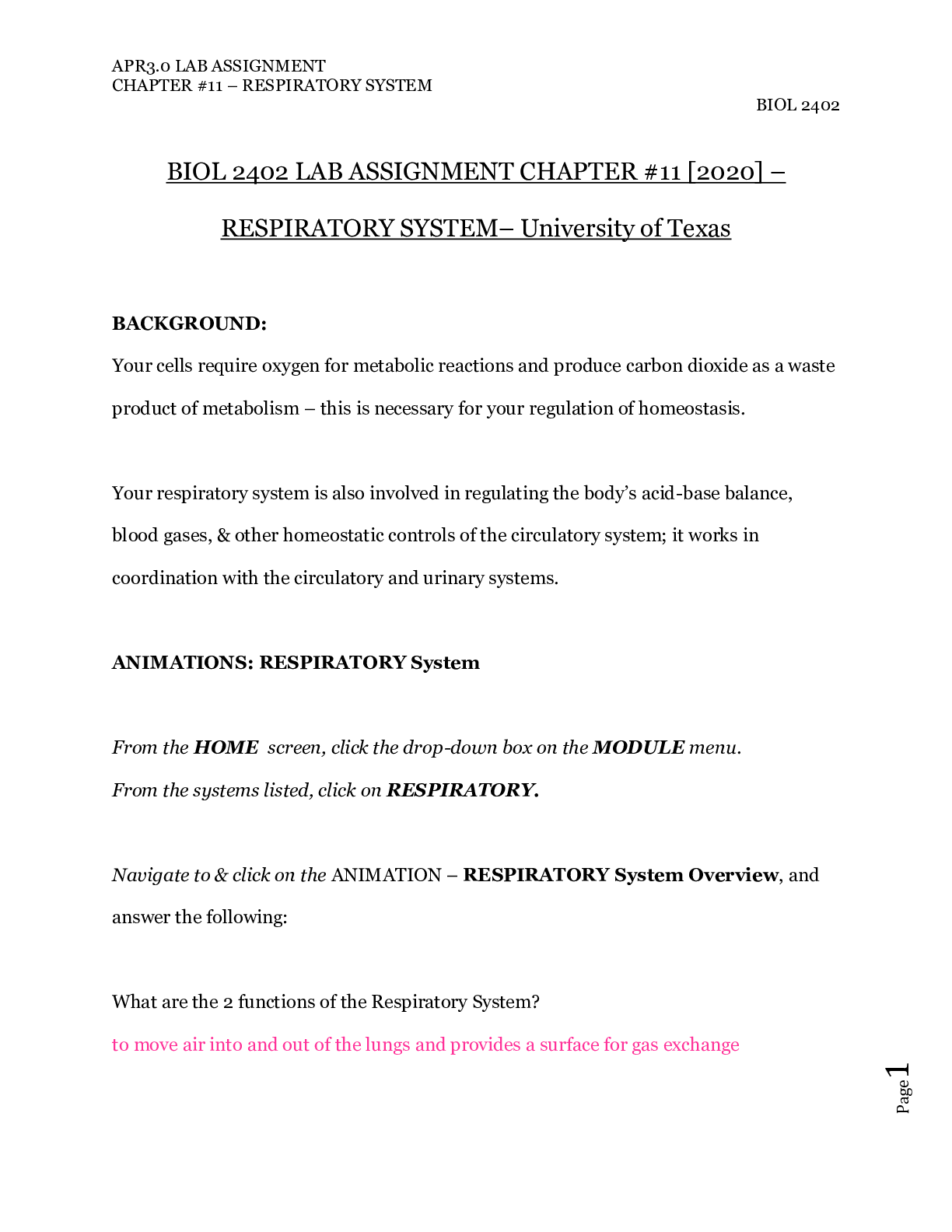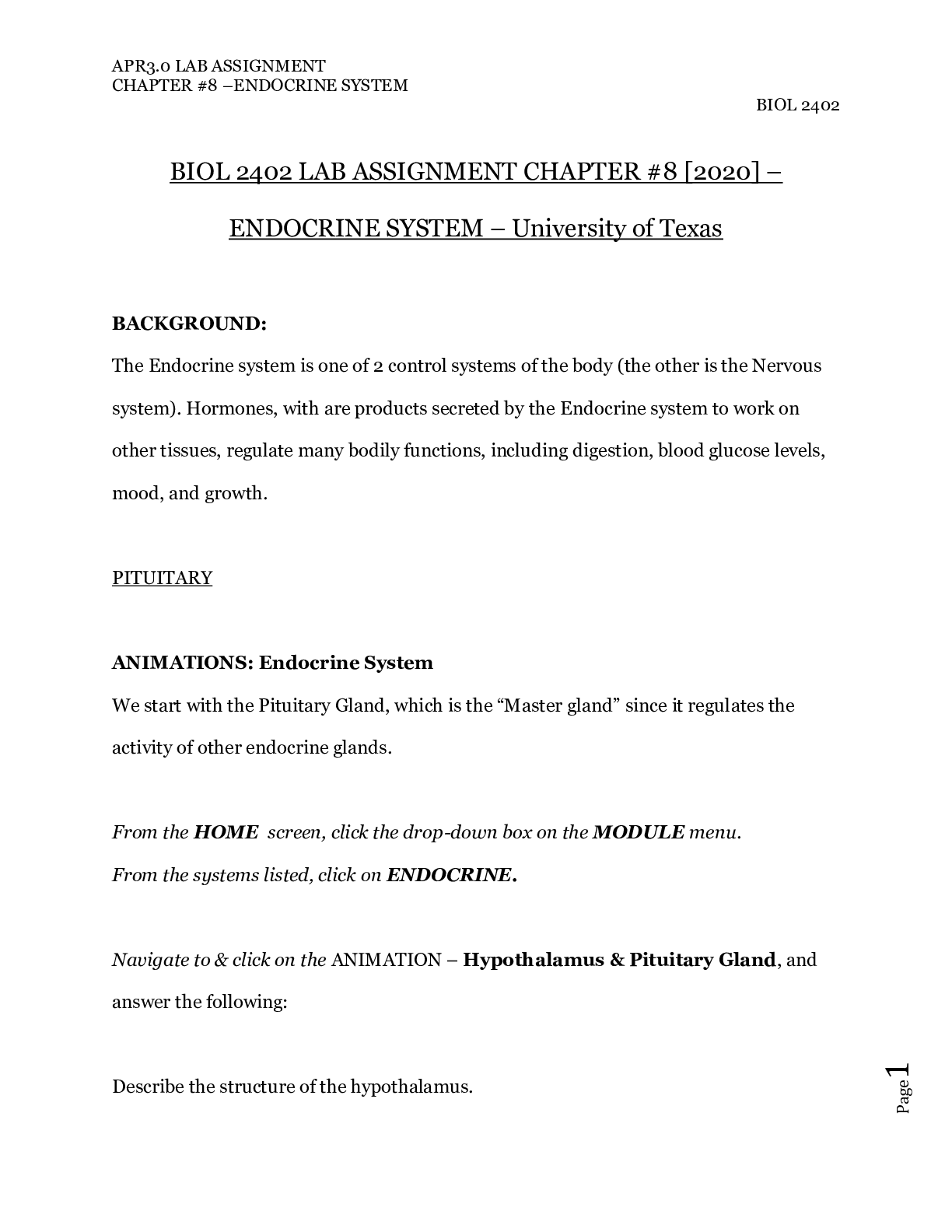*NURSING > EXAM > NURS 3481 Legal_and_Ethical_Basis_for_Practice_Chapter_6 - University of Texas | NURS3481 Legal_and_ (All)
NURS 3481 Legal_and_Ethical_Basis_for_Practice_Chapter_6 - University of Texas | NURS3481 Legal_and_Ethical_Basis_for_Practice_Chapter_6
Document Content and Description Below
Chapter 6: Legal and Ethical Basis for Practice Test Bank MULTIPLE CHOICE 1. A psychiatric nurse best implements the ethical principle of autonomy when he or she: a. intervenes when a self-mut... ilating patient attempts to harm self. b. stays with a patient who is demonstrating a high level of anxiety. c. suggests that two patients who are fighting be restricted to the unit. d. explores alternative solutions with a patient, who then makes a choice. 2. Which action by a psychiatric nurse best supports patients’ rights to be treated with dignity and respect? a. Consistently addressing each patient by title and surname. b. Strongly encouraging a patient to participate in the unit milieu. c. Discussing a patient’s condition with another health care provider in the elevator. d. Informing a treatment team that a patient is too drowsy to participate in care planning. 3. Two hospitalized patients fight when they are in the same room. During a team meeting, a nurse asserts that safety is of paramount importance and therefore the treatment plans should call for both patients to be secluded to prevent them from injuring each other. This assertion: a. reveals that the nurse values the principle of justice. b. reinforces the autonomy of the two patients. c. violates the civil rights of the two patients. d. represents the intentional tort of battery. 4. In a team meeting a nurse says, “I’m concerned whether we are behaving ethically by using restraint to prevent one patient from self-mutilation while the care plan for another patient who has also self-mutilated calls for one-on-one supervision.” Which ethical principle most clearly applies to this situation? a. Beneficence b. Autonomy c. Fidelity d. Justice 5. Which scenario is an example of a tort? a. The primary nurse does not complete the plan of care for a patient within 24 hours of the patient’s admission. b. An advanced practice nurse recommends that a patient who is dangerous to self and others be voluntarily hospitalized. c. A patient’s admission status is changed from involuntary to voluntary after the patient’s hallucinations subside. d. A nurse gives an as-needed dose of an antipsychotic drug to a patient to prevent violent acting-out because a unit is short staffed. 6. A nurse’s neighbor asks, “Why aren’t people with mental illness kept in state institutions anymore?” What is the nurse’s best response? a. “Many people are still in psychiatric institutions. Inpatient care is needed because many people who are mentally ill are violent.” b. “Less restrictive settings are now available to care for individuals with mental illness.” c. “Our nation has fewer persons with mental illness; therefore fewer hospital beds are needed.” d. “Psychiatric institutions are no longer popular as a consequence of negative stories in the press.” 7. Which nursing intervention demonstrates false imprisonment? a. A confused and combative patient says, “I’m getting out of here and no one can stop me.” The nurse restrains this patient without a health care provider’s order and then promptly obtains an order. b. A patient has been irritating, seeking the attention of nurses most of the day. Now a nurse escorts the patient down the hall saying, “Stay in your room or you’ll be put in seclusion.” c. An involuntarily hospitalized patient with suicidal ideation runs out of the psychiatric unit. A nurse rushes after the patient and convinces the patient to return to the unit. d. An involuntarily hospitalized patient with suicidal ideation attempts to leave the unit. A nurse calls the security team and uses established protocols to prevent the patient from leaving. 8. A patient should be considered for involuntary commitment for psychiatric care when he or she: a. is noncompliant with the treatment regimen. b. sold sells and distributes illegal drugs. c. threatens to harm self and others. d. fraudulently files for bankruptcy. 9. A nurse at the mental health center prepares to administer a scheduled injection of haloperidol decanoate (Haldol depot injection) to a patient with schizophrenia. As the nurse swabs the site, the patient shouts, “Stop, stop! I don’t want to take that medicine anymore. I hate the side effects.” Select the nurse’s best initial action. a. Stop the medication administration procedure and say to the patient, “Tell me more about the side effects you’ve been having.” b. Say to the patient, “Since I’ve already drawn the medication in the syringe, I’m required to give it, but let’s talk to the doctor about skipping next month’s dose.” c. Proceed with the injection but explain to the patient that other medications are available that may help reduce the unpleasant side effects. d. Notify other staff members to report to the room for a show of force and proceed with the injection, using restraint if necessary. 10. Several nurses are concerned that agency policies related to restraint and seclusion practices are inadequate. Which statement about the relationship of substandard institutional policies and individual nursing practice should guide nursing practice? a. The policies do not absolve an individual nurse of the responsibility to practice according to the professional standards of nursing care. b. Agency policies are the legal standard by which a professional nurse must act and therefore override other standards of care. c. In an institution with substandard policies, the nurse has a responsibility to inform the supervisor and leave the premises. d. Interpretation of policies by the judicial system is rendered on an individual basis and therefore cannot be predicted. 11. A newly admitted patient who is acutely psychotic is a private patient of the senior psychiatrist. To whom does the psychiatric nurse who is assigned to this patient owe the duty of care? a. Health care provider b. Profession c. Hospital d. Patient 12. An example of a breach of a patient’s right to privacy occurs when a nurse: a. asks a family to share information about a patient’s prehospitalization behavior. b. discusses the patient’s history with other staff members during care planning. c. documents the patient’s daily behaviors during hospitalization. d. releases information to the patient’s employer without consent. Environment 13. An adolescent hospitalized after a violent physical outburst tells the nurse, “I’m going to kill my father, but you can’t tell anyone.” Select the nurse’s best response. a. “You’re right. Federal law requires me to keep that information private.” b. “Those kinds of thoughts will make your hospitalization longer.” c. “You really should share this thought with your psychiatrist.” d. “I am obligated to share information with the treatment team.” 14. A voluntarily hospitalized patient tells the nurse, “Get me the forms for discharge against medical advice so I can leave now.” What is the nurse’s best initial response? a. “I can’t give you those forms without your health care provider’s knowledge.” b. “I will get them for you, but let’s talk about your decision to leave treatment.” c. “Since you signed your consent for treatment, you may leave if you desire.” d. “I’ll get the forms for you right now and bring them to your room.” 15. The family of a patient whose insurance will not pay for continuing hospitalization considers transferring the patient to a public psychiatric hospital. The family expresses concern that the patient will “never get any treatment.” Which reply by the nurse would be most helpful? a. “Under the law, treatment must be provided. Hospitalization without treatment violates patients’ rights.” b. “That’s a justifiable concern because the right to treatment extends only to the provision of food, shelter, and safety.” c. “Much will depend on other patients because the right to treatment for a psychotic patient takes precedence over the right to treatment of a patient who is stable.” d. “All patients in public hospitals have the right to choose both a primary therapist and a primary nurse.” 16. Which individual with a mental illness may need emergency or involuntary hospitalization for mental illness? The individual who: a. resumes using heroin while still taking methadone. b. reports hearing angels playing harps during thunderstorms. c. throws a heavy plate at a waiter at the direction of command hallucinations. d. does not show up for an outpatient appointment with the mental health nurse. 17. A patient being treated in an alcohol rehabilitation unit reveals to the nurse, “I feel terrible guilt for sexually abusing my 6-year-old child before I was admitted.” Based on state and federal law, the best action for the nurse to take is to: a. anonymously report the abuse by telephone to the local child abuse hotline. b. reply, “I’m glad you feel comfortable talking to me about it.” c. respect nurse-patient relationship of confidentiality. d. file a written report on the agency letterhead. 18. The spouse of a patient who has delusions asks the nurse, “Are there any circumstances under which the treatment team is justified in violating the patient’s right to confidentiality?” The nurse must reply that confidentiality may be breached: a. under no circumstances. b. at the discretion of the psychiatrist. c. when questions are asked by law enforcement. d. if the patient threatens the life of another person. 19. A nurse cares for an older adult patient admitted for the treatment of depression. The health care provider prescribes an antidepressant medication, but the dose is more than the usual adult dose. The nurse should: a. implement the order. b. consult a drug reference. c. give the usual geriatric dosage. d. hold the medication and consult the health care provider. 20. A patient with paranoid schizophrenia believes evil spirits are being summoned by a local minister and verbally threatens to bomb a local church. The psychiatrist notifies the minister. The psychiatrist has: a. released information without proper authorization. b. demonstrated the duty to warn and protect. c. violated the patient’s confidentiality. d. avoided charges of malpractice. 21. After leaving work, a staff nurse realizes that documentation of the administration of a medication to a patient was omitted. This off-duty nurse telephones the unit and tells the nurse, “Please document the administration of the medication I forgot to do. My password is alpha1.” The nurse should: a. fulfill the request. b. refer the matter to the charge nurse to resolve. c. access the record and document the information. d. report the request to the patient’s health care provider. 22. A patient with mental illness asks a psychiatric technician, “What’s the matter with me?” The technician replies, “Your wing nuts need tightening.” The patient looks bewildered and wanders off. The nurse who overheard the exchange should take action based on: a. violation of the patient’s right to be treated with dignity and respect. b. the nurse’s obligation to report caregiver negligence. c. preventing defamation of the patient’s character. d. supervisory liability. 23. Which documentation of a patient’s behavior best demonstrates a nurse’s observations? a. Isolates self from others. Frequently fell asleep during group. Vital signs stable. b. Calmer and more cooperative. Participated actively in group. No evidence of psychotic thinking. c. Appeared to hallucinate. Patient frequently increased volume on television, causing conflict with others d. Wears four layers of clothing. States, “I need protection from dangerous bacteria trying to penetrate my skin.” MULTIPLE RESPONSE 1. A nurse volunteers for a committee that must revise the hospital policies and procedures for suicide precautions. Which resources would provide the best guidance? Select all that apply. a. Diagnostic and Statistical Manual of Mental Disorders (fourth edition, text revision) (DSM-IV-TR) b. State’s nurse practice act c. State and federal regulations that govern hospitals d. Summary of common practices of several local hospitals e. American Nurses Association Scope and Standards of Practice for Psychiatric– Mental Health Nursing Practice 2. In which situations does a nurse have a duty to intervene and report? Select all that apply. a. A peer is unable to write behavioral outcomes. b. A health care provider consults the Physicians’ Desk Reference. c. A peer tries to provide patient care in an alcohol-impaired state. d. A team member has violated the boundaries of a vulnerable patient. e. A patient refuses a medication prescribed by a licensed health care provider. 3. Which situations qualify as abandonment on the part of a nurse? (Select all that apply.) The nurse: a. allows a patient with acute mania to refuse hospitalization without taking further action. b. terminates employment without referring a seriously mentally ill for aftercare. c. calls police to bring a suicidal patient to the hospital after a suicide attempt. d. refers a patient with persistent paranoid schizophrenia to community treatment. e. asks another nurse to provide a patient’s care because of concerns about countertransference. [Show More]
Last updated: 1 year ago
Preview 1 out of 13 pages
Instant download
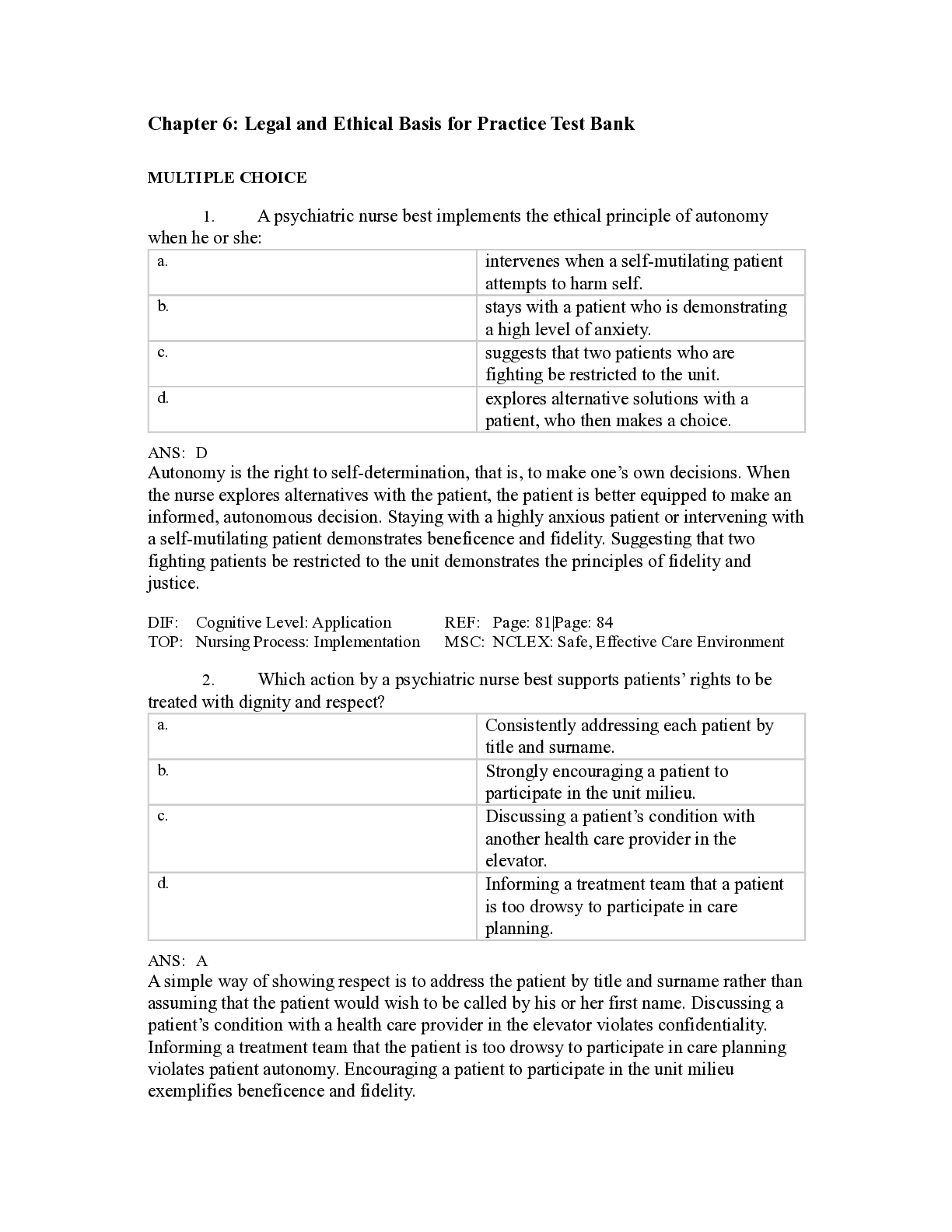
Buy this document to get the full access instantly
Instant Download Access after purchase
Add to cartInstant download
Reviews( 0 )
Document information
Connected school, study & course
About the document
Uploaded On
Aug 05, 2020
Number of pages
13
Written in
Additional information
This document has been written for:
Uploaded
Aug 05, 2020
Downloads
0
Views
34

